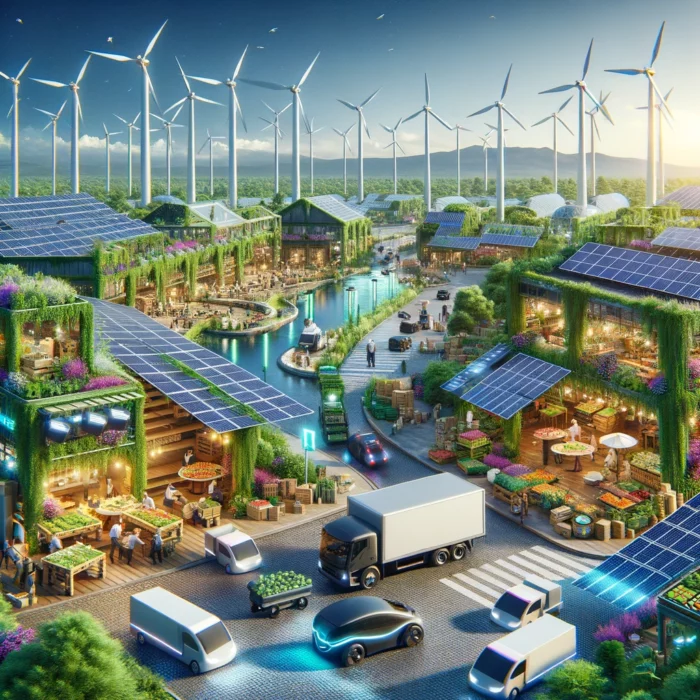
Sustainability Bites (Part 1): Transforming the F&B Wholesale Landscape for a Greener Tomorrow
There has been a lot of talk in the last year about sustainability and how needed it is for our planet and businesses. However, during one of the most difficult times to be a F&B wholesale business owner, we don’t have time to research how our businesses can be more sustainable. Our two-part blog aims to educate you on the landscape of sustainability in the F&B industry and provide you with actionable steps to help your wholesale business be more sustainable.
Current Climate (Sustainability in the F&B Industry)
Since the pandemic, the world has been aware of the increasing concerns of climate change and hence the pressure on the F&B industry to decarbonize is immense. Over the last few years, experts have found out that the F&B industry is responsible for 36% of global emissions. The F&B industry ESG rating is lower than massive industries like construction, which is very alarming! Hence why huge consulting companies like McKinsey have announced that with their F&B clients, they will be making sustainability a main goal via key strategic action.
Now the major issue in the F&B space is that post-pandemic, the cost of survival has increased to a level where it is hard for businesses to exploit spare capital for sustainability. Hence, a lot of F&B companies have decided to narrow their focus and prioritize the most pressing issues. For the moment, the majority of companies are concentrating on four main concerns: reducing their impact on the planet; improving sustainable food sourcing; lowering food waste; and expanding their product range. (In part 2 we explore more on how companies have actually done this)
What Has Driven The Change In The F&B Industry To Try And Be More Sustainable?
- Consumer Pressure: hence most of the buying power in today’s world lies with the Gen Z age group, it is very important to understand their emotions. A lot of Gen Z buyers want to feel good about what they eat, not guilty.
- Investor Pressure: Investors are an increasingly powerful voice in the clamour for sustainable action, with two-thirds of European CFOs saying they feel pressure from shareholders and investors to act on climate change, and 57% of executives agreeing that their organization is facing significant pressure from investors to report on climate-related risk and management.
- Concerns over Climate Change: As noted by research consultants Edelman Intelligence, F&B industry leaders and decision-makers are even more concerned than consumers regarding climate change, with 67% agreeing that it’s more important to do good than to not harm, vs. 57% of consumers.

Benefits of Being Sustainable
Cost Reduction: Green systems minimize operating costs by reducing fuel consumption, transportation, energy use, and raw material waste. Additionally, green packaging lowers production costs by eliminating material waste, while warehouses powered by clean energy decrease long-term operational expenses, aligning with upcoming supplier sustainability mandates.
Regulations and Compliance: In line with the UN's 2030 sustainable development goals, nations are tightening emissions and pollution regulations, spotlighting F&B wholesaler sustainability. To ensure compliance, F&B wholesalers can adopt eco-friendly delivery practices, utilizing electric vehicles, optimizing energy use, and minimizing waste. All of this not only supports compliance but also helps avoid potential fines, promoting a sustainable business approach.
Pressure from Investors and Partners: Demonstrating and validating ethical operations not only opens doors to new investment opportunities but also paves the way for valuable partnerships. In today's landscape, sustainable supply chain management is highly prized, and industry leaders seek dependable partners to enhance their image.
USP to Clients: Your commitment to sustainability becomes a distinct advantage, appealing to clients who prioritize responsible sourcing and enhancing your brand reputation in a competitive market. In essence, being sustainable isn't just good for the planet – it's a strategic advantage for your business.
Examples of Companies That Did It:
Charlie Bigham’s
- Bigham’s is an artisan-tasting ready meals provider, that prioritizes delivering restaurant-quality food, using premium ingredients, and avoiding preservatives to ensure a home-cooked taste. Beyond their culinary focus, the company stands out for its strong commitment to charitable and community work. Bigham’s has established enduring relationships with organizations addressing food waste and food poverty. Their B Corp certification underscores their dedication to conducting business with a focus on social and environmental well-being.
COOK
- COOK excels in providing quality frozen meals with a homemade touch. Notably, their RAW Talent Programme, part of their ethical initiatives, helps individuals facing employment challenges find stable positions at COOK. Recognized with a "B Corp" certification, COOK demonstrates a commitment to high ethical standards, transparency, and accountability.
Lily’s Kitchen
- Lily’s Kitchen provides ethical pet food for the UK's 10 million dogs, prioritizing quality ingredients without fillers. Developed with vet and nutritionist input, their recipes focus on pet well-being. The company is also environmentally conscious, using eco-friendly packaging and organic ingredients. Notably, Lily’s Kitchen is the world’s first pet food company to qualify as a B Corp.
We hope that this blog shines some light on the status quo of the F&B space, understanding why it is important to be sustainable and how your company can benefit from being sustainable. Stay tuned for part 2 for actionable tasks that you as a business owner can do to be more sustainable.
Are there any other topics you’d like us to cover in our blog? Please do let us know at [email protected].




